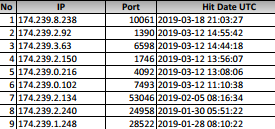Movie Company Uses DMCA Subpoena Shortcut to Identify Pirates

The music industry had just defeated Napster, but P2P file-sharing remained a massive problem. Applications such as KaZaA, Morpheus, Grokster, and eDonkey, had millions of users each.
Since filing federal lawsuits is relatively expensive, the RIAA attempted to take a shortcut by applying for so-called DMCA subpoenas. These are not reviewed by a judge, as regular subpoenas are, and only require a signature from the court clerk.
While this worked initially, Internet providers soon started to object. They argued that DMCA subpoenas are only valid when an Internet service stores or links to the infringing content, not when they merely pass on traffic.
Several courts, including the DC Circuit Court of Appeals, agreed with the ISPs and effectively banned the practice. If copyright holders want to go after individual downloaders, they have to file a complaint and request a regular subpoena.
While these rulings were established at the start of the last decade, Hawaii attorney Kerry Culpepper sees things differently. Representing the rightsholders of the movie “Hunter Killer,” he recently requested a DMCA subpoena against Verizon.
Culpepper and his client are not new to copyright litigation. Far from it. They have been involved in several lawsuits against alleged pirates, obtaining regular subpoenas. However, in this case, they are taking the shortcut.
Instead of filing a complaint, Culpepper applied for a DMCA subpoena to compel Verizon to identify the account holders behind 20 IP-addresses which allegedly shared a copy of the movie “Hunter Killer” via BitTorrent.
The court clerk signed off on this request, without oversight from a judge. This is pretty significant, as it means that the movie company can obtain the identities of the alleged pirates with limited expense, without having to file a lawsuit.
If this becomes common practice, it will become a goldmine for so-called copyright trolls. Now that more and more federal courts are pushing back against these cases, refusing to issue regular subpoenas, they could simply request DMCA subpoenas and avoid filing a lawsuit altogether.
There’s a big IF of course, as we noted that appeals courts outlawed similar practices over a decade ago. So how is this different now?
Looking at the filing, we see that Hunter Killer’s attorney is well aware of the precedents. They are mentioned in the subpoena application, but Culpepper argues that these earlier cases don’t necessarily apply here.
The rulings in the DC Circuit and Eighth Circuit appeals courts both concluded that DMCA subpoenas can’t be issued against ISPs that are mere conduits. This is because the “notifications” described in the DMCA could not be applied to ISPs that don’t store infringing material. As such, DMCA subpoenas were not an option.
Culpepper counters that the Ninth Circuit Appeals Court, which Hawaii and other states such as California fall under, never ruled on the mere conduit issue in a case like this. Hence, it’s an open question. In fact, Hunter Killer’s attorney notes that more recent decisions suggest that the DMCA notifications are valid in this case.
In the more recent repeat infringer cases against ISPs such as Cox and Grande, courts have concluded that these providers have no right to a DMCA safe harbor because they failed to act on DMCA notifications. This suggests that these notices are valid and apply to conduit providers.
Commenting in a personal capacity, not on behalf of his client, Culpepper informs TorrentFreak that these decisions suggest that DMCA subpoenas are valid too.
“The Fourth Circuit in BMG v. Cox, determined that Cox had no safe harbor preventing them from liability for infringement because of Cox’s failure to terminate the accounts of repeat infringers based upon the notifications received from Rightscorp among other reasons,” Culpepper says.
“These are the same types of notifications the DC Circuit and Eighth Circuit said were not valid for a 512(h) subpoena, yet here they were deemed sufficiently valid for triggering loss of safe harbor.”
Culpepper has many other counterpoints as well, but in this instance, these were not needed. The clerk issued the subpoena, which is what he and Hunter Killer were after.
The question remains, of course, is what they will do with the personal details of the alleged infringers. In theory, the information could be used to demand settlements, however, they could also serve as evidence for a bigger case.
In the past, Culpepper has approached file-sharers, not to sue or settle with them, but to build a case against the pirate apps there were using. This is what happened in a Showbox-related lawsuit, for example, and could happen here as well.
That said, the revival of the DMCA subpoena is definitely a major event that will be watched closely by rightsholders and ISPs. In this case, we see no evidence that Verizon objected, but if the practice becomes more common, the matter may end up in court.
—
A copy of Culpepper’s application and the signed DMCA Subpoena, spotted by Cashman, is available here (pdf).
Source: TF, for the latest info on copyright, file-sharing, torrent sites and more. We also have VPN reviews, discounts, offers and coupons.



Leave a Reply
Want to join the discussion?Feel free to contribute!